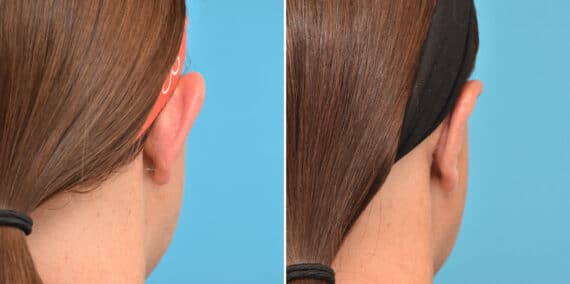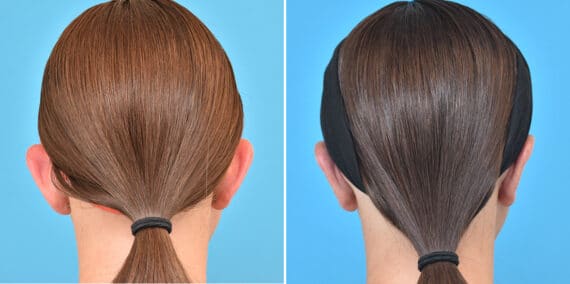Correcting big or projecting ears, large earlobes, and other deformities helps to improve the appearance of the ears in a cosmetic surgery called otoplasty—also known as ear pinning or ear reshaping surgery.
People of all ages—including adults and children—who want to increase their self-esteem and general appearance find this surgical operation to be appealing.

Improve your Otoplasty Recovery
- Otoplasty is a cosmetic surgery that reshapes the outer ear to improve appearance and correct deformities.
- The typical recovery time for otoplasty is about two weeks, with avoidance of strenuous activities for several more weeks.
- Prescribed pain medications are essential for managing discomfort and reducing inflammation during recovery.
- Proper incision care, including keeping them clean and protected from sunlight, is crucial to prevent infections and promote healing.
- Patients should avoid touching their ears, sleep with their heads elevated, wear easy-to-remove clothing, and avoid rigorous activities to ensure a smooth recovery.
What is Otoplasty?
Otoplasty is a surgical technique that reshapes the outer ear to improve appearance and rectify abnormalities. Making incisions behind the ears, the operation removes or reshapes the cartilage, then uses stitches to maintain the new shape in place. Depending on the patient’s goals and necessity, otoplasty can be done on one or both ears. Choosing a plastic surgeon with board certification provides the best possible result and reduces your risk of problems.
What is the Typical Recovery Time for Otoplasty Surgery?
Recovering time depends on age, health, and following post-operative instructions. Ear surgery heals usually in two weeks. Patients should wait a few more weeks before working out; still, they can start regular activities almost one week later.
Patients recovering could have edema, itching, numbness, and pain. Correct medication and treatment will enable one to control these symptoms.
Tips for a Comfortable Recovery from Otoplasty
Don’t Touch or Rub Your Ears
During the healing process, you should not touch or rub your ears since this can irritate, infect, or compromise the surgical incisions. Maintaining clean hands, follow the instructions of your surgeon on appropriate incision care.
Try also to keep your hair away from your ears since, should it come into touch with the incisions, it can irritate or infect you. Keeping your hair back and away from your ears can be achieved with a soft headband or hair clips.
Take Prescribed Pain Medication
To help you control discomfort during the recovery phase, your surgeon may prescribe a pain reliever. Contact your doctor about any issues or side effects; be sure you take the medicine as recommended.
Some pain relievers can also help reduce inflammation, allowing for a faster and smoother healing process. If the prescribed medication does not offer adequate relief, talk to your doctor about other options or changes to your present prescription.
Protect Your Head from Heat
Hot temperatures can be uncomfortable and slow down the healing process. In hot weather, keep your head cool by staying indoors or wearing a hat.
Other than staying home and wearing a hat, you could apply a cold compress to ease any heat-related discomfort. To prevent direct touch with your skin and apply the compress gently for brief times, wrap it in a soft cloth.
Sleep with Your Head Elevated
Sleeping with your head up helps lower pressure at the surgery areas and alleviate edema. To keep a raised posture during sleep, use a combination of pillows or a specifically made wedge pillow.

Otoplasty Patient Results
* All patients are unique and individual results may vary.
Wear a Protective Headband at Night
Your surgeon could advise wearing a specific headband to guard your ears while you sleep throughout the healing time. Make sure you follow the instructions of your surgeon on the timing and length of headband wearing.
A headband that supports your ears can also help keep them clean and free of dust and other things that could get in them. This is especially important if you live in a dirty or polluted area. This additional protection can help to lower the risk of infection and problems during recovery.
Be Careful with Your Incisions
Proper incision care will reduce the possibility of problems and contribute to a successful recovery. Clean and dress the incisions according to your surgeon’s recommendations, and avoid using hydrogen peroxide or other harsh chemicals that may cause healing to take longer. If you see any signs of infection, such as increased pain, redness, swelling, or discharge, call your doctor right away.
It’s crucial to keep the area around your ears clean and sterile. Remember to follow your surgeon’s recommendations for how to care for your incision. Change your pillowcase often and avoid washing the area with used towels or washcloths.
Keep Away from Sun Exposure
Direct sunlight can harm healing skin and increase the chance of scarring. To protect your ears from sun exposure, use a wide-brimmed hat and apply a high-SPF sunscreen. Also, avoid utilizing tanning beds and other UV sources throughout the healing period.
You should avoid direct sun exposure, even indirect sunlight might be dangerous during your recovery. Spend time outside staying in the shadow wherever you can.
Wear Easy-to-Remove Clothes
Choose clothes that you can easily put on and take off without causing pain or accidentally harming your ears. Use loose-fitting tops or button-ups that don’t require pulling over your head. This will stop any accidental pressure on your ears during otoplasty recovery.
You can discover as you recuperate that some fabrics or clothes materials irritate or hurt around your ears. We recommend resting the incision area of otoplasty on soft, breathable fabrics like cotton to minimize any potential irritation and promote a more comfortable recovery process.
Avoid Rigorous Activity
Doing intense physical activity or heavy lifting can raise the risk of complications and slow down recovery. It’s essential to steer clear of vigorous exercise and contact sports for at least four to six weeks after surgery, or until your surgeon gives you the green light. As your body heals, prioritize getting enough sleep and gradually ease back into your routine.
Looking to Reshape Your Ears?
Experience world-class treatment from our top-rated providers at Becker Plastic Surgery.
Talk with an Otoplasty Expert
If you are interested in ear correction surgery, consult with an expert surgeon who specializes in this field. Engaging in a conversation with an experienced otoplasty surgeon can provide valuable insights, information, and guidance to help you make an informed decision.
At Becker Plastic Surgery, our team of expert physicians is experienced in otoplasty techniques. Contact us today to schedule a consultation in New Jersey or Philadelphia so that we can guide you on the best course of action for your specific situation.

